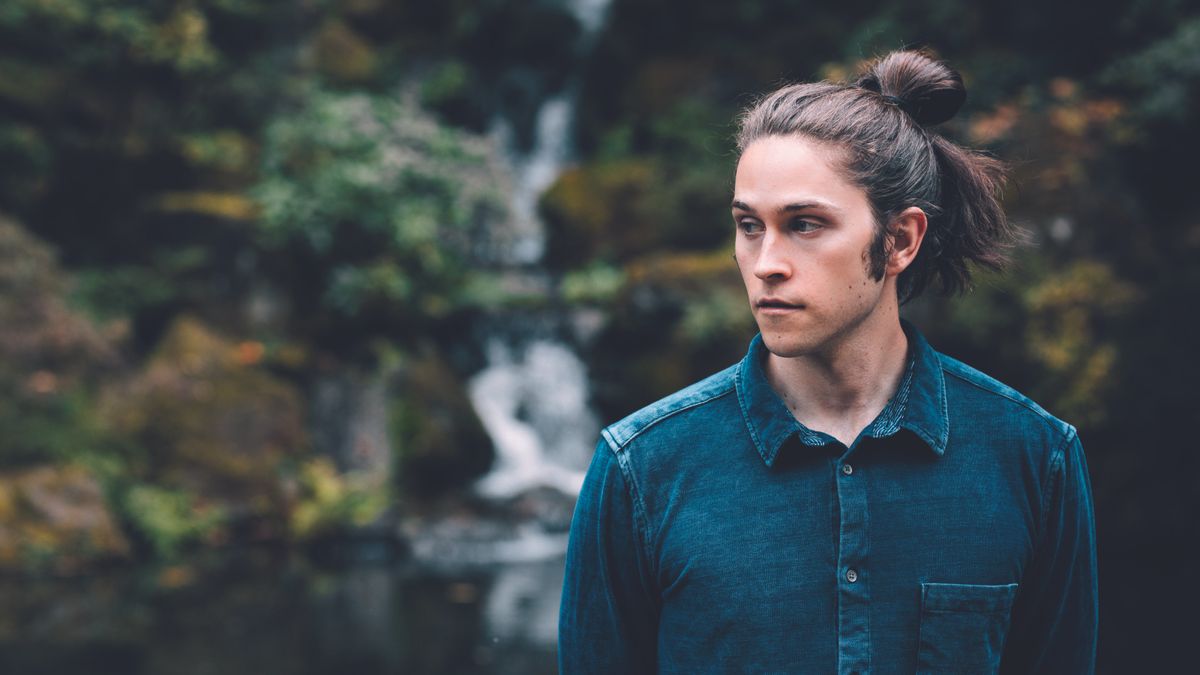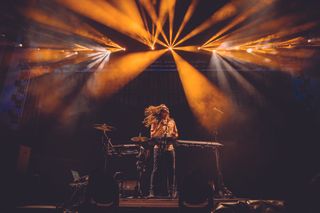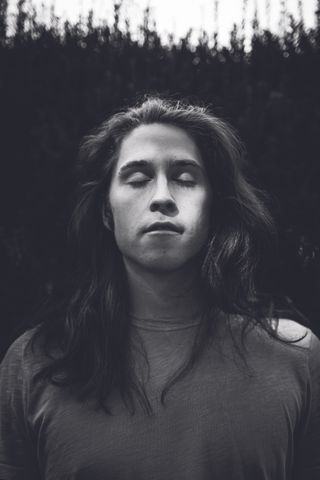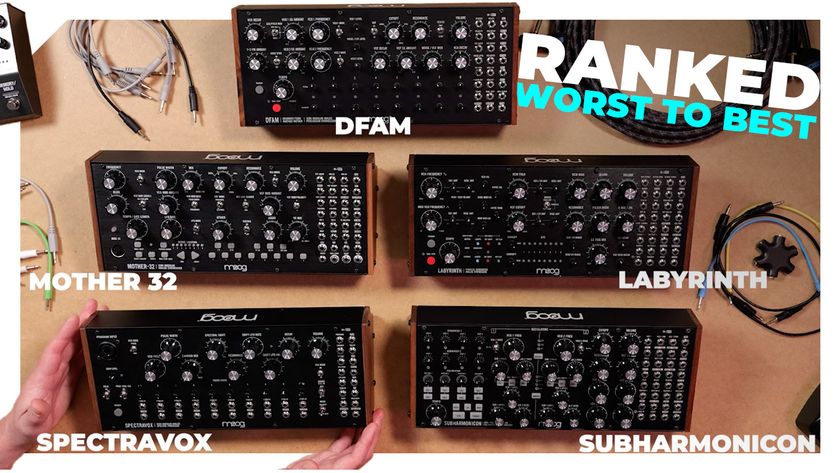Big Wild: "There’s enough negativity out there already. I want my music to offer hope and a way out of that sadness.”
Following the huge hit Aftergold, the US producer brings together nature and technology on his debut album, Superdream

“The place where you live definitely shapes the music you make.” Apologies for revisiting a subject we’ve covered before, but it’s obviously something that Jackson Stell – aka Big Wild – feels very strongly about.
“I grew up in Massachusetts on the East Coast of America,” explains Stell, “and I did an internship at a studio in New York. I was totally immersed in music and I was even beginning to make some money, but the songs I was writing were rooted in hip-hop. Totally different to anything you’ll find on my new album.”
In 2012, Stell moved to California – his girlfriend was from the ‘Sunshine State’ – not far from the dramatic Big Sur coastline and, as he stared out across the Pacific Ocean, his musical world shifted on its axis.
“I was suddenly hearing different sounds in my head. The natural beauty of the landscape became part of the songs I wanted to write. It even gave my music an identity. Up until that point in time, I’d been trying out a bunch of different names, but that’s where I came up with Big Wild.”
The early Big Wild releases were suitably chilled… almost meditative and ambient at times. Relaxed beats, lush pads and the occasional waft of a pan pipe. One track in particular, 2016’s Aftergold, was picking up some serious interest. Its slightly poppier vibe seemed to be screaming out for a vocal, which was duly supplied by Tove Styrke, and that’s when things got interesting. Apple used it on one of their ads, it topped Spotify’s Global Viral Chart, there were sold out live shows, remix offers from the likes of ODESZA and CHVRCHES… y’know the kind of thing. No wonder it’s taken Stell so long to get around to putting out his debut album. Superdream was released in February and features his trademark Big Sur sound, but it’s also surprisingly heavy on vocals, often supplied by Stell himself.
“I don’t quite know how it’s happened, but I seem to have turned into a frontman,” he says with a mighty grin.
So, can we look forward to Big Wild, the Freddie Mercury Years?
Get the MusicRadar Newsletter
Want all the hottest music and gear news, reviews, deals, features and more, direct to your inbox? Sign up here.
“Ha ha! You’ve just given me an idea for the new live show!
Aftergold was a huge hit for Big Wild. And, of course, he then did what all of us would do… he tried to work out why that particular song was so successful.
“All producers go through that thing of sitting in the studio at the end of the day, listening back to a couple of tracks and thinking, ‘That’s pretty good’. But when something blows up like Aftergold, it’s kind of hard to understand. It happens, but you don’t quite know why it happened. Why that track and not this track? So you start pulling everything apart, looking for answers. What is it that makes a certain song resonate with people? The only answer I found was… there is no answer!
“And maybe it’s better not to know. If everybody knew what made a song successful, all we’d hear is the same song over and over again. Isn’t it better to make your own music?
“Be brave. Do it your way. If you can get that far and you have a little bit of luck on your side, things will start to happen.”
You’ve said that hip-hop was your musical starting point. Who were you mostly listening to in those early days?
“The usual suspects… Dr Dre, Neptunes, Timbaland. Yes, I was listening to a lot of hip-hop, but it wasn’t the raps or the vocals that interested me. I realised early on that what really caught my attention was the production. The moment when you hear a track and it sounds different to all the other stuff you’re listening to. When you hear the Neptunes, they sound unique. More than anything else. That’s what I was interested in. I wanted my music to sound like me.
“You listen to some producers and the beauty of their sound is that it almost doesn’t fit. You find yourself wondering, ‘Is this right? What’s happened to that snare?’ But that’s the whole point. You sometimes need to go against the grain, because that’ll make people sit up and take notice.”
Your first musical projects were beats. You were making instrumental grooves for would-be MCs to attack.
“Yeah, it was all about the beat. I had no interest in writing a ‘hit’ single. No interest in being a performer myself. I had a very clear idea about that.”
Did you play an instrument?
“I played the trumpet!”
Yes! About time we got a mention for brass in this mag! And fiendishly difficult to recreate with software unless you’re willing to spend a few quid.
“Sadly, the trumpet never made it on to my early recordings. Ha ha! The trumpet might sound like a strange choice of instrument, but my older brother played trumpet, so I wanted to play it, too. I also played a bit of piano. Unfortunately, I never really clicked with that whole ‘traditional’ musical thing. I got bored trying to play scales on the trumpet. I got bored with the piano. Yes, it was music, but it didn’t feel like the music I wanted to play. I never made a real connection.
“There was one important missing ingredient… a computer!”
Not a synth, not a drum machine or even a guitar?
“No, the music I understood was all made on computer. That was going to be my instrument. We did have a PC at home – it was nothing special; just a basic Gateway model – and I kind of stole it from the family. At the time, you could download a demo version of FruityLoops for 30 days, so that’s what I did… for a whole year! I never actually owned it, I just used to constantly get the demo version, work on songs for a month and then bounce down my ‘master’ versions. That was it. As soon as my month was up, I knew the songs had to be finished.
“The crazy thing is that I do kind of wish I could go back to that way of working. If you’ve got a deadline in your head, you will automatically work to that. You concentrate on the things that matter and don’t get caught up in all the little details. At the end of the 30 days, I had something that I could listen to. The fruits of my labour.”
You felt that the computer was going to be your instrument, but did the change from trumpet to mouse feel natural.
“Completely! Like I said before, I never really felt at home with traditional instruments. With the computer and some software, I could make songs that sounded like the songs I was downloading and listening to. A beat, a bassline. Trying to understand what made them work.”
Did you find any answers? What makes ‘Beat A’ better than ‘Beat B’?
“I’m not sure I did. There certainly wasn’t a day when I thought, ‘Ah, OK, so that’s how you make a great beat’. Are there rules for making great beats? It could be something very simple, like your choice of hi-hat or snare. Ironically, as technology progresses, finding unique sounds is becoming harder and harder to do, because we’re all using the same bits of software and the same sample packs. Or finding the same sound on Splice.
“When I first started, there wasn’t the availability that we have today, so a lot of my time was spent searching… investigating. Looking for a random bit of noise that might make all the difference. I wonder if we’ve all lost a little bit of patience in recent years. Everything has to be immediate. Now, now, now!
“Again, I think it comes down to getting some of your own personality into what you’re doing. Not just trying to replicate what you’re hearing in other songs. And that can be very intimidating. We all naturally listen to songs that we like, or songs that have been successful and think that we have to make something exactly like that. That becomes the standard.
“It’s scary to start making your own thing because… well, people might not like it. It’s as if they’re saying that they don’t like you. From experience, I can tell you that you will grab some people. Not everyone, but that’s perfectly OK. Yeah, it feels risky at first, but there are also rewards. The people that do like what you’re doing will become even more passionate about it because they’re specifically being attracted to your sound.”

We probably need to mention quantisation. What was your preferred method for beat creation… bang-on or wonky? Or a little bit of both?
“Oh, I was definitely on the beat at first. If you quantise everything, then you can be sure it’s in the right place. You can see it on the grid. One-two-three-four. That’s going to work. Then, as I got more and more comfortable with my role as producer and started to know my way around FL Studio, I could get a bit more adventurous. Eventually, everything came to be way off the grid. My wonkiness just came as a natural evolution.
“As were my production skills. To start with, I wasn’t very technical. I didn’t know the exact frequency for the snare. I didn’t know how to create the perfect kick. It was all about feel. And hard work. The sheer number of hours I used to spend working on my music. The more time you put in, the more you learn and the more you begin to realise what works and what doesn’t.”
Are you still mostly using FruityLoops… aka FL Studio?
“After that year with the demo version, I did actually go on to buy it, and it became my platform for about eight years. Everything was working fine. I was making music that people seemed to like. So, what do I do? Change platforms. Great idea, eh?
“When I started doing my internship at the studio in New York, I was obviously coming into contact with the professional world of the producer. And it seemed that everyone was talking about Pro Tools. Pro Tools-this, Pro Tools-that. It was the industry standard. If it’s the industry standard, I’d better start working on Pro Tools. That’s what I need.
“I’m sure people will understand what I’m talking about here… you stop listening to the voice in your head and kind of get wrapped up in the world you’re working in. But Pro Tools was a silly move for me. Totally the wrong set of tools. After all those years on FruityLoops, it seemed inefficient. Ill-suited to what I was doing in the studio.
“And I guess I have to mention that this all coincided with me finally moving away from just doing beats.”
Tired of the same-old-same-old?
“Not at all. Things were going great. Making beats was providing me with a living… I was making money from music. What had started out as a high school hobby had become a business. I used to supply my beats via a website called SoundClick – I think it’s still out there – and it was going so well that I had to get myself a proper lawyer to sort out all the licensing and what have you.
“The change was all to do with the music I was listening to. This was the era when Soundcloud was booming and I found myself digging through all sorts of different music. Electronic music, as opposed to purely hip hop. There was so much amazing stuff out there. So many interesting ideas. Producers who were taking music in all sorts of new directions.”
Any names that stood out?
“That’s a difficult question to answer because I was listening to so much. Every day would reveal something new for me. I do remember being very inspired by a guy called Djemba Djemba. Hearing a few tracks and remixes, and beginning to get the idea of where I might be headed.”

Are you still based on the East Coast at this point?
“Yes, but we are getting very close to the move West. And there was another big change, too. After the disappointment of Pro Tools, I switched over to Ableton Live.”
Do you think that had any impact on the music you were making? Your move towards ‘electronic’ music?
“At the time, I would have disagreed, but, looking back, you’re probably right. Listening to all this new music on Soundcloud, the arrival of Ableton Live and then the move to California. All of them played their part.
“Ableton Live certainly gave me a whole new sound palette to work with, plus the immediacy you get with Live. The way you can build a song so quickly.”
Sounds like you were hardware-free up until this point. Is that still the case?
“Apart from the computer, MIDI keyboard, interface, monitors – everything else is in the box. Actually, I did record some guitars for the new album, too, but they were all processed in the computer. Most of the album was done on an old 2013 MacBook, but then I moved up to a new iMac Pro last year, and the last bits were made using that.”
“My main tools? Serum, just because it’s brilliant. Korg’s MonoPoly; something about the sound feels very analogue. Almost everything by Soundtoys, with excessive use of EchoBoy. A bunch of Waves stuff, including the MondoMod. That’s the first plugin which has really given me the vibrato and controllable modulation I’ve been looking for. Reverbs? Valhalla, of course. VintageVerb most of the time, or Shimmer if I needed that extra… shimmer of warmth.”
There seems to be a lot of ‘warmth’ in the average Big Wild track.
“Making this album really allowed me to grow as a songwriter. All those years ago, I started off with the simplest things, just a beat and a bassline. But each step along the way has taken me somewhere new. First, it was looking at song structure, then it was lyrics. Realising that I had something to say… especially after what I went through personally in the last few years. [Stell was diagnosed with thyroid cancer in 2013, but it was spotted early and he was eventually given the all-clear.]
“When you experience something like that, it forces you to ask questions. It forces you to look around and work out what really matters. Although there were some very difficult times for me, I came out of the other side with a fresh perspective on life. And I think that filtered directly into this album. I wanted to make happy songs. Maybe ‘happy’ isn’t the right word – I don’t mind melancholic or ‘sad’ songs, but I don’t want my music to feel negative from start to finish. There’s enough negativity out there already. If there is sadness in a song, I like to turn that around at some point. Maybe go from a minor feel to something major on the last drop. I want my music to offer hope and a way out of that sadness.”
The album Superdream by Big Wild is out now on Counter Records


Computer Music magazine is the world’s best selling publication dedicated solely to making great music with your Mac or PC computer. Each issue it brings its lucky readers the best in cutting-edge tutorials, need-to-know, expert software reviews and even all the tools you actually need to make great music today, courtesy of our legendary CM Plugin Suite.











